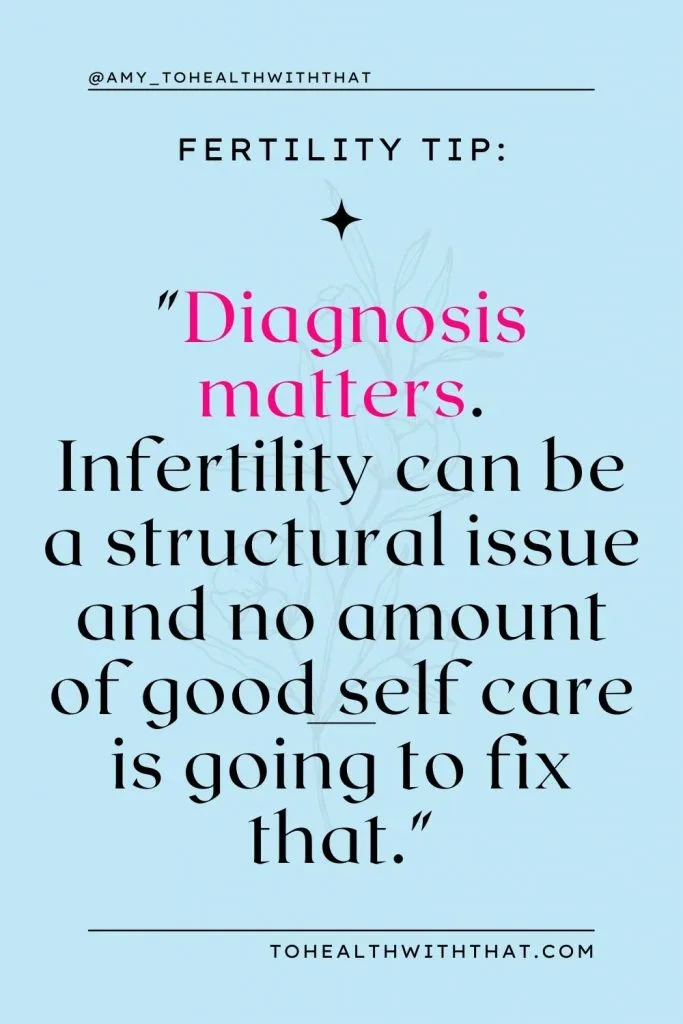Fertility is an area that many people are scared to really look into very deeply. Many of us pass our most fertile years in higher education, in an intense career, or happily enjoying single life. That is wonderful, but then when you decide to actually try for a baby, there may be some surprises on the journey.
Fertility is something that most of us assume we have, but what happens when your fertility milestones pass (see last week’s post if you don’t know what those are), and you don’t have a baby?
The Next Step is To Find Out What Is Going On, But Lots of People Skip This.
So let’s talk about why finding out the cause of your reduced fertility is pivotal to getting to baby-in-arms.
First, many couples put the burden of fertility care on the woman, but…
- Female factor infertility makes up 37 percent of infertile couples in developed countries
- Male factor infertility is the issue in 8 percent
- Both male and female factor infertility represents 35 percent
This means that if you’re only working on the woman’s fertility, you’re missing the big picture, and not helping on the journey toward a baby.

Getting a diagnosis: The causes of female infertility
The most common identifiable female factors, which accounted for 81 percent of female infertility, were:
OVARIAN
- Ovulatory disorders (25 percent)
- PCOS
- Thyroid
- Oocyte aging
- Including premature ovarian insufficiency
UTERUS
- Endometriosis (15 percent)
- Endometriosis has been estimated to affect 10 to 15 percent of women of reproductive age. Of women with endometriosis, 30 to 50 percent are estimated to have infertility. Of women who present with infertility, 25 to 50 percent are estimated to also have endometriosis.
- Pelvic adhesions (12 percent)
- Tubal blockage (11 percent)
- Other tubal abnormalities (11 percent)
- Hyperprolactinemia (7 percent)
Of special note: Celiac disease — Women with untreated celiac disease may have an increased frequency of reproductive abnormalities, including infertility, miscarriage, and intrauterine growth restriction
“Unexplained Infertility”
“Unexplained infertility” is the diagnosis given to couples after a thorough evaluation has not revealed a cause. Many cases of unexplained infertility may be due to small contributions from multiple factors including MTHFR polymorphisms, COMT polymorphisms, nutritional deficiencies, etc… This is another great time to see an ND if you haven’t already.
Many conditions overlap to contribute to both repeat miscarriage or difficult conception. Factors can include genetic polymorphisms like MTHFR and more than 100 other single nucleotide polymorphisms, chromosomal abnormalities, nutrition, hormone balance, and mental and emotional factors. Even stress has been shown to reduce fertility across the conception window, which is difficult news for anyone feeling stressed about conceiving. We’ll talk about that in more detail in an upcoming episode.

Causes of Recurrent Miscarriage, Repeat Pregnancy Loss, or RPL
Recurrent miscarriage means early pregnancy loss (EPL) for nonviable, intrauterine pregnancies within the first trimester, that has happened more than once.
This situation should get its own specific diagnostic work-up and has its many causes. Causes can be:
- Structural like uterine polyps
- Immunologic like antiphospholipid syndrome
- Endocrine like hypothyroid or low progesterone
- Genetic like MTHFR or thrombophilia
- Combination like COMT mutation and endometriosis with pelvic adhesions
The most important thing to understand is that some issues are structural and even if you’re doing all of the right things for fertility, it isn’t going to happen unless you fix the structural problem. No amount of good nutrition, progesterone, or natural medicine is going to fix that. Great examples of this are pelvic adhesions and tubal blockage.
There is no one-size-fits-all with fertility care and you have a relatively brief window of time to figure this out, so it really matters to be proactive about your fertility and find the cause as much as you are able.
Infertility is one of the most common problem that every other individual is facing these days. It is a disease that can affect both men and women. Infertility arises when the male or female reproductive system doesn’t function properly. It can be defined by the failure to achieve a pregnancy after 12 months with regular unprotected sexual intercourse.
The causes of infertility are different in both male and female reproductive systems. However, it is sometimes impossible to discover a single cause.
Female infertility can be caused by:
-
Ovulation disorders such as closed fallopian tubes, hormonal disorders like polycystic ovary syndrome, and hyperthyroidism or hypothyroidism.
- Uterine disorders such as cervix abnormalities, and polyps in the uterus or its shape.
- Early menopause. It happens when the menstruation cycle stops before the age of 40. It may arise because of immune system diseases, turner syndrome, radiation, or chemotherapy treatment.
- Endometriosis occurs when endometrial tissue grows outside the uterus. It then affects everything from the function of the ovaries, uterus, and fallopian tubes.
- MTHFR genetic variances are associated with higher risk of repeat miscarriages.
Male Fertility is caused by:
-
Abnormal sperm function and quality can arise due to undescended testicles, health problems such as diabetes, genetic defects including MTHFR, or infections such as HIV, gonorrhea, and more.
-
Dysfunctionality in the ejection of sperm as a result of sexual problems. There are many causes that lead to this dysfunctionality such as cystic fibrosis, premature ejaculation, blockage in the testicles, or damage or injury to the reproductive organs.
-
Hormonal disorders.
-
Drug use like smoking, alcohol, marijuana, and taking medications to treat depression, anxiety, bacterial infections, etc. can affect fertility.
-
Exposure to radiation or chemotherapy because of cancer can also impair sperm production in males.
There is no reliable evidence that the Covid-19 vaccine causes infertility. Studies have shown that ovarian follicular function is not altered by infection with Covid-19 or BNT162B2 mRNA Covid vaccine.
According to data from World Health Organization (WHO), there is no link between abortion and infertility. If you have a safe abortion, you can have safe pregnancies in the future. That is not the case with abortions that are associated with complications. Infections due to incomplete or unsafe abortions could spread in the fallopian tubes and ovaries, which is called pelvic inflammatory disease (PID). PID can increase the risk of infertility. If you recently had an abortion, look for these signs:
- Severe pain
- High temperature
- Smelly vaginal discharge
If you experience these symptoms, immediately go to your doctor to prevent any infection.
MTHFR causes infertility in both men and women.
Any problem in the methylation process can affect the growth of the tissues and cellular development, which also disrupts the growth of the egg and endometrium. Hence, it becomes difficult to implant the egg during the menstrual cycle.
Methylation problems also disrupt hormone levels, for example, low progesterone levels, low estrogen during ovulation, and less-sensitive ovaries. All of these issues can cause female infertility.
When it comes to male fertility, the methylation process is equally necessary. It drives sperm formation, development, and viability. Impaired methylation affects sperm count and fertility, so men with unbalanced MTHFR polymorphisms are at higher risk for infertility.
MTHFR is a common genetic mutation that can contribute to anxiety, depression, fatigue, chronic pain, infertility, and more serious conditions like breast implant illness, heart attack, stroke, chronic fatigue syndrome, and some types of cancer. If you know or suspect you have an MTHFR variant, schedule a free 15-minute meet-and-greet appointment with MTHFR expert Dr. Amy today.
Book Your Appointment
